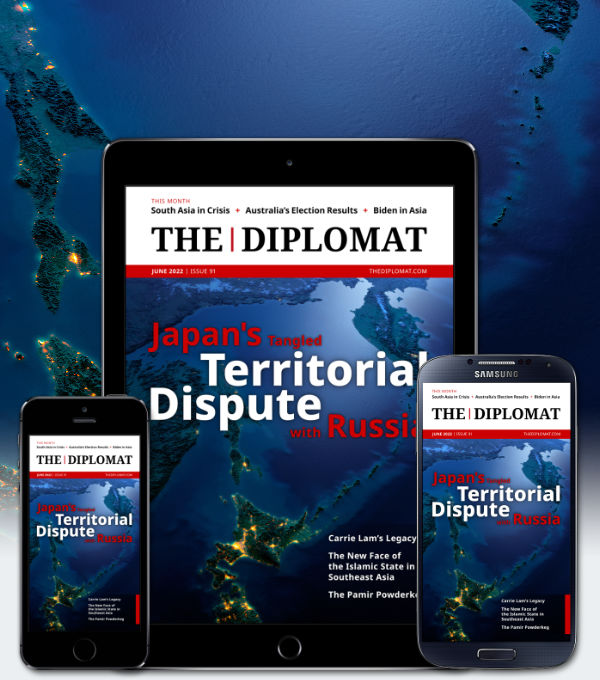| Welcome to the latest issue of Diplomat Brief. This week our top story examines the economic policy of the Albanese government in Australia, which faces high inflation, global shortages, and a lingering pandemic. We also have an interview with Gregory Poling, the director of the Southeast Asia Program and Asia Maritime Transparency Initiative at the Center for Strategic and International Studies, on the history of U.S. involvement in the South China Sea. |
| Story of the week |  | Economy Australia’s New Government Faces an Economic Trial-by-FireWhat Happened: When Australia elected a new government on May 21, most commentary focused on the foreign policy ramifications of the Labor Party’s return to power. But the Albanese government also faces immediate economic tests. As new Treasurer Jim Chalmers put it in a recent speech, “The situation we’ve inherited is serious. In some instances, it is dire.” Can the new government achieve its promised “stronger and more inclusive” economy amid accelerating inflation, trade troubles, and global turmoil? Our Focus: Analysts expect more continuity than change on the economic front, with Labor’s already modest campaign promises probably set to be further constrained by the economic reality – including growing concerns about government debt. “They’ll run bigger deficits than the [former] government, but it was already running large deficits, so we won’t be talking big increases in relative terms,” Gene Tunny, a former Treasury adviser and currently a principal at Adept Economics, told The Diplomat. “Regarding tax, I don’t think we’ll see too many changes. [Labor] got burned last election trying to make big changes to the tax system.” Even on climate change, one of the biggest divergences between the old and new governments, expect modest, slow steps: “Labor will try and look like they’re doing something [on emissions] without damaging emission-intensive, trade-exposed industries,” Tunny said. What Comes Next: Economists say Australia can withstand a housing downturn and higher interest rates through a lower exchange rate, stronger population growth, increased business investment, and continued elevated prices for key commodity exports such as coal and iron ore. But it will take some fancy footwork from the new government to tread the proper line. The COVID-19 pandemic broke Australia’s 28-year streak of economic growth; will the headwinds of 2022 also prove too strong to face down? Read this story |
| Behind the News | INTERVIEW Gregory PolingGregory Poling, the director of the Southeast Asia Program at CSIS and author of “On Dangerous Ground: America’s Century in the South China Sea,” on the U.S. approach to the South China Sea disputes: “In one episode after another detailed in the book – late 1930s, 1956, 1974, 1988, 1995, 2012 – the U.S. government was caught flat-footed by crises in the South China Sea… Leaders would have to scramble to figure out what prior U.S. policy had been and then try to implement it on the fly.” Read the interview |
| This Week in Asia | Northeast Asia Tensions Rise on the Korean PeninsulaJust one month into South Korean President Yoon Suk Yeol’s term, worries about a spiraling arms race appear to be coming to fruition. As promised, Yoon reinvigorated joint military exercises with the United States; in response to the latest drills, North Korea launched eight ballistic missiles on Sunday. The U.S. and South Korea responded with their own flurry of missile launches and other U.S. allies joined in aerial drills a few days later. Meanwhile, a North Korean nuclear test seems to be a question of when, not if. Find out more | South Asia Sri Lanka’s New PM Seeks a Way out of Economic CrisisSri Lanka’s protesters managed a partial victory last month, when Prime Minister Mahinda Rajapaksa stepped down and was replaced by seven-time PM Ranil Wickremesinghe. Now the new prime minister is scrambling to find a way out of the economic crisis that drove Sri Lankans to the street. As negotiations with the IMF continue, China will remain a key wild card in Sri Lanka’s quest for debt relief. Find out more | Southeast Asia Singapore Hosts the Shangri-La DialogueAfter two years of COVID-19-related cancellations, the IISS Shangri-La Dialogue, Asia’s premier security summit, will take place in Singapore on June 10-12. Japanese Prime Minister Kishida Fumio is set to deliver the keynote address, the first by a Japanese leader since an address by Abe Shinzo in 2014. However, the main attention will be on speeches by U.S. Defense Secretary Lloyd Austin and China’s Defense Minister Wei Fenghe, which will present the two superpowers’ competing visions for the Indo-Pacific. Find out more | Central Asia ‘Elbasy’ No More: Kazakhstan Approves Constitutional ChangesOn June 5, around 70 percent of Kazakhstan's eligible voters reportedly cast ballots, with 77 percent voting to approve a raft of constitutional changes. The most dramatic changes remove the position of “elbasy” – the “leader of the nation” – from the constitution. Of course, Nursultan Nazarbayev, for whom the title was crafted, had already seen his star fade in the aftermath of “Bloody January.” Whether the updated constitution can usher in a “new Kazakhstan” is an open question. Find out more |
| Visualizing APAC |  | Dilfuza Ibdova, a blogger in Bukhara, Uzbekistan, is one of the few journalists in the country who feels free of pressure from the SSS. She says the security services do not bother her because several went to prison after they severely beat and tortured her two brothers, killing one. See the full picture |
| Word of the Week | Society 口袋罪Kǒudài zuì, literally “pocket crimes” in Mandarin, these are vaguely defined crimes that could be applied to various activities, from reporting on COVID-19 to remembering the Tiananmen Square crackdown in 1989. Find out more |
|  |





